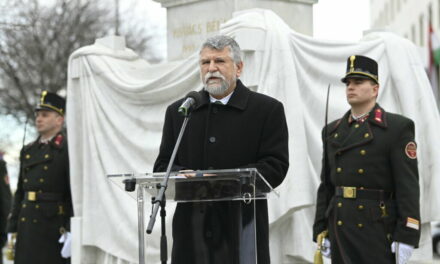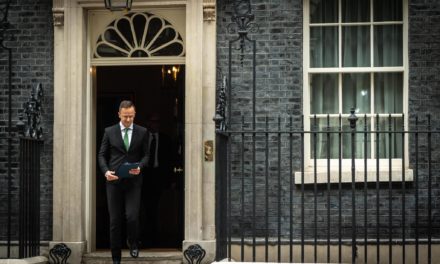The United States has carried out dozens of military interventions in recent decades, and in only one of these cases can it be said with certainty that the intervention ultimately resulted in lasting democratic change.
An important topic nowadays is the responsibility of the great powers, especially America, which is considered the world's leading economic and military power, i.e. superpower, in relation to preserving the peacefulness of the international situation and avoiding the aggravation of conflicts that have already broken out. Some, for example, in the case of the war in Ukraine, the armed struggles and economic confrontations that have brought a lot of suffering and serious difficulties for the whole of Europe, do not speak of a Russian-Ukrainian war, but of a Russian-American war, in their argument also shedding light on the undeniably existing conflicts of power and geopolitical interests in the region. . Jr. writes about this to Origo. Constitutional lawyer Zoltán Lomnici, director of Századvég.
John Mearsheimer, an American political scientist and expert in international relations, recently came to Hungary at the invitation of the Századvég Public Life Knowledge Center Foundation. As part of the book launch, the world-famous realist's book A nagy téveszme: Liberal dreams and international realities, published by Századvég Publishing House, was presented. One of the main speakers at the book launch was Gábor Főrész, president of Századvég, who said that it seems as if in recent years the XX. The "ghosts" of the 20th century would return, and this is also indicated by the current war. The president of Századvég also recalled that the United States had carried out 35 interventions since 1948, but only one of them led to lasting democratic change. In other words, "democracy export" is not very effective. He explained that large-scale "social engineering" in the affected countries was usually followed .
As for the traditional foreign policy stance of the aforementioned United States, the intellectual and political foundations of interventions began to solidify from the beginning of the 19th century. At that time, they were largely driven by the economic opportunities of the Pacific Ocean and Latin America, which was mainly under the rule of Spain, as well as the foundations of the famous Monroe Doctrine born in 1823 (named after the reigning president at the time). The essence of the latter is that the United States must strive for a policy against European colonialism in the Western Hemisphere, that is, in the Jeffersonian tradition, to achieve the secure and irreversible independence of the states of the double continent of North and South America, representing the "old world" in Europe. from powers.
An interesting approach to the roots of American foreign policy is that, Walter LaFeber , US imperialism was significantly different from that of the European powers: this is shown by the fact that America's newly acquired territories represented an interest covering 125,000 square miles, which was approximately 1/37th of the British territory. empire, and 1/28th part of the French colonial empire. According to the historian, it is clear that
the Americans mainly wanted markets, new locations for economic exchange activities, and did not seek to acquire colonies.
The fact that the United States intervened in both world wars (from 1917 and from 1941), thus significantly contributing to their outcome, is a development that still affects us to this day. In the second such conflict, it fought alongside its Western and Soviet allies against Japan and Germany and their allies. However, in the years after the Second World War, the USA - which replaced the declining Great Britain as the world's leading superpower - was irreconcilably confronted with Stalin's Eastern Empire, and one of the most fundamental goals of its active foreign policy became the prevention of the spread of "world communism".
As a few historical examples, the 1953 coup in Iran organized by the USA and the British was a significant operation in this circle, but also the 1961 Bay of Pigs invasion aimed at Castro's Cuba, as well as the 1966 military overthrow of the already corrupt Indonesian President Sukarno and considered very cruel with the support of General Suharto. The USA has provided several examples of how interventionism can become a political practice of intervention, through which it is possible to intervene in the internal political affairs of other countries through many different means, for example by carrying out certain military or commercial interventions. The United States intervened in the national elections, for example, in Italy in 1948, when a communist party with significant support still existed in the southern European state, but also in the Philippines in 1953, as well as, for example, in the former World War II enemy Japan in the 1950s and 1960s. during the years (and Japan's constitution, which has been in force since 1947, was also created under strong American pressure).
The United States' interventions may have several different goals, resulting from the particularities of the given state, territory, or geopolitical region. This can primarily be the acquisition of territory (capable, usable operational area), aspects of the economy, providing social or humanitarian protection where appropriate, as well as supporting system changes and political transitions, in this context achieving policy change, democracy and regime building, or most importantly in the given area protection of resident American citizens and diplomats.
Between 1776 and 2019, the United States used the tools of military intervention very often, with half of the operations since 1950 and more than a quarter since the end of the Cold War (the dissolution of the Soviet Union in 1991). However, while the United States has carried out dozens of military interventions in recent decades, in only one of these cases can it be said with certainty that the intervention ultimately resulted in lasting democratic change. In other words, we can also conclude that this kind of American model and practice of "democracy export" has not proven to be very effective.
Many experts and scientists tried and are still trying to uncover the reasons for the failure of the US wars and reconstruction efforts. Some see the main reasons in the political ideology itself, while others see it not in systems of ideas and views. However, the main triggering factor can be mentioned that the US or any other government was fundamentally unable to centrally plan and organize the complex range of social, political and economic institutions that characterize a liberal democratic society. While Washington's foreign policy has been striving for many decades to "recreate" and reshape the world in its own likeness, liberal-based foreign policy experiments have often led to serious failures. These "social engineering collaborations" were usually followed by complete confusion and upheaval in the affected countries, the situation often failed to consolidate and even made the life of entire regions even more uncertain.
There is an approach according to which American efforts, especially those based on the spread of democracy and thus even aimed at expanding the circle of federations and "cliques" - and in some places also provoking nationalist resistance - were often even aimed at inciting hostilities, for example between rival powers such as Russia and China , but these attempts ultimately backfired. John Mearsheimer , liberal internationalist policies tended to clash with nationalism, but often led to the emergence of serious economic concerns even in liberal, Western countries, within the circle of US allies; the liberal approach particularly harmful
Regarding Hungary, it is an important aspect that the goals related to the democratic values of economic and political freedom as well as foreign and security policy are common and in many respects can even be considered identical to those of the United States. This was especially effective during the presidency of Donald Trump in alliance cooperation. However, in the spirit of the transatlantic idea, close cooperation with North America and the development of relations in the diplomatic, military, scientific and commercial fields are still strategically important for the European Union and for our country - also within the bonds of NATO membership. is also a high priority for Hungary and our continent.
However, the responsibility of NATO and especially the United States, which gives it its determining power, is unavoidable in terms of whether it is able and willing to go beyond the foreign policy principles of liberal hegemony, implement a responsible diplomatic agenda and practice, and thus, for example, refrain from any kind of international provocation, especially in view of today's for his period of gunpowder tension. In addition to the territorial integrity or political independence of states as larger political communities governed by self-determination, stated as a basic principle of international law, the military great powers – such as the United States and Russia, for example – have the principles of cooperation, equal rights and freedom of self-determination of peoples and nations, and sovereign equality should also be kept in mind.
By asserting an understanding that is based on the classic idea of real politics and recognizes the right to exist of foreign policies representing national-sovereign approaches, mainly within the Western federal system, but even outside of it. This could result in fewer wars and much more diplomatic success for the Western world, and thus, of course, for the United States as well. And for this, as Gábor Fűresz stated at the event, clear, reality-based thinking would be needed in order to finally close the XX century. century, and it is possible to start in some other direction.
Featured image: Attila Polyák













